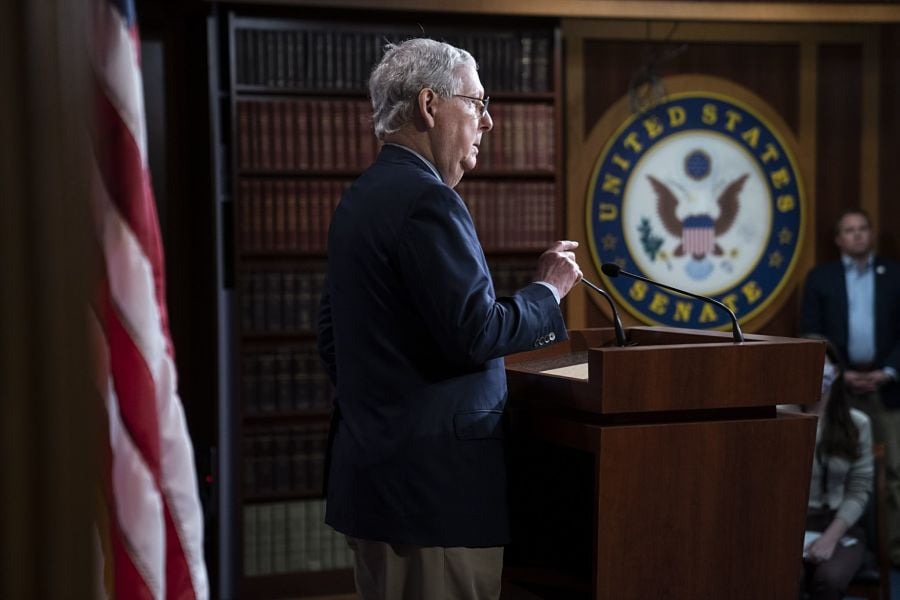

The last time America’s states were in the throes of a crippling fiscal crisis, an idea was floated in Washington to help them swiftly bring it to an end: Let them file for bankruptcy and escape from the trillions of dollars owed to bondholders and retired public employees.
The proposal was immediately condemned by Wall Street investors, public employee unions and Republican and Democratic governors, who said it was unnecessary and would saddle them with rising interest rates by spooking the bond market. The discussion was dropped after a single hearing in the U.S. House of Representatives.
But on Wednesday, with the nation’s state capitals again facing massive budget shortfalls because of the stalled economy, the idea resurfaced when Senate Majority Leader Mitch McConnell voiced support for it during a radio interview.
“I would certainly be in favor of allowing states to use the bankruptcy route,” McConnell, a Republican from Kentucky, said during an interview on the Hugh Hewitt show. “It saves some cities. And there’s no good reason for it not to be available.”
The comments came as Congress considers extending aid to cities and states that are seeing tax revenue disappear as wide swaths of the economy are shut down. The resulting budget gaps could force deep spending cuts that would exert a drag on any recovery. Governors alone have asked for $500 billion to help soften the blow of what could be the worst fiscal crisis they have faced in decades, with cities also requesting funds.
But allowing states to file for bankruptcy is unlikely to gain much support, given the near universal opposition it faced a decade ago. Then, states were quick to say it was unneeded: With the broad power to raise taxes, no state has defaulted on its debt since the Great Depression. Even only a handful of struggling cities resorted to bankruptcy during the last contraction, since it was seen as a last resort that would hobble their ability to raise money for public works.
Matt Fabian, a partner with Municipal Market Analytics who testified before Congress during the House hearing in 2011 when state bankruptcy was last raised, said it’s just an effort to sidestep the discussion about extending aid.
“That’s just a red herring,” Fabian said of McConnell’s comments. “State bankruptcy is probably not possible under the U.S. Constitution, and there’s even less chance that Congress would attempt to allow it. The senator’s statement is really about the likelihood of his caucus providing more aid directly to the states than it is about state bankruptcy.”
“Once you start talking about state bankruptcy being a better option than more federal assistance, you’re really saying you don’t want to provide more federal assistance,” he said.
There has been little speculation on Wall Street that states will be unable to pay their debts because of the coronavirus pandemic, even though it’s expected to increase the financial strains on already struggling states such as New Jersey and Illinois. While municipal bond prices tumbled last month during waves of panicked selling, they rebounded after Congress enacted the $2.2 trillion stimulus bill.
Eric Friedland, director of municipal research at Lord Abbett & Co., said that McConnell’s comments, while “unsettling,” are unlikely to create panic among municipal bond investors.
On Wednesday, yields on top-rated 10-year bonds rose 6 basis points to 1.21% while yields on the longest-dated debt climbed 6 basis points to 2.04%.
Democrats unsuccessfully pushed for state aid in the interim rescue package that passed the Senate Tuesday. McConnell took credit for blocking that, saying there should be a “fulsome” discussion among all senators on whether and how to send more aid to state and local governments and what that money should be spent on.
“My guess is their first choice would be for the federal government to borrow money from future generations to send it down to them now so they don’t have to do that,” McConnell said of states. “That’s not something I’m going to be in favor of.”

While industry statistics pointing to a succession crisis can cause alarm, advisor-owners should be free to consider a middle path between staying solo and catching the surging wave of M&A.

New joint research by T. Rowe Price, MIT, and Stanford University finds more diverse asset allocations among older participants.

With its asset pipeline bursting past $13 billion, Farther is looking to build more momentum with three new managing directors.

A Department of Labor proposal to scrap a regulatory provision under ERISA could create uncertainty for fiduciaries, the trade association argues.

"We continue to feel confident about our ability to capture 90%," LPL CEO Rich Steinmeier told analysts during the firm's 2nd quarter earnings call.
Orion's Tom Wilson on delivering coordinated, high-touch service in a world where returns alone no longer set you apart.
Barely a decade old, registered index-linked annuities have quickly surged in popularity, thanks to their unique blend of protection and growth potential—an appealing option for investors looking to chart a steadier course through today's choppy market waters, says Myles Lambert, Brighthouse Financial.
